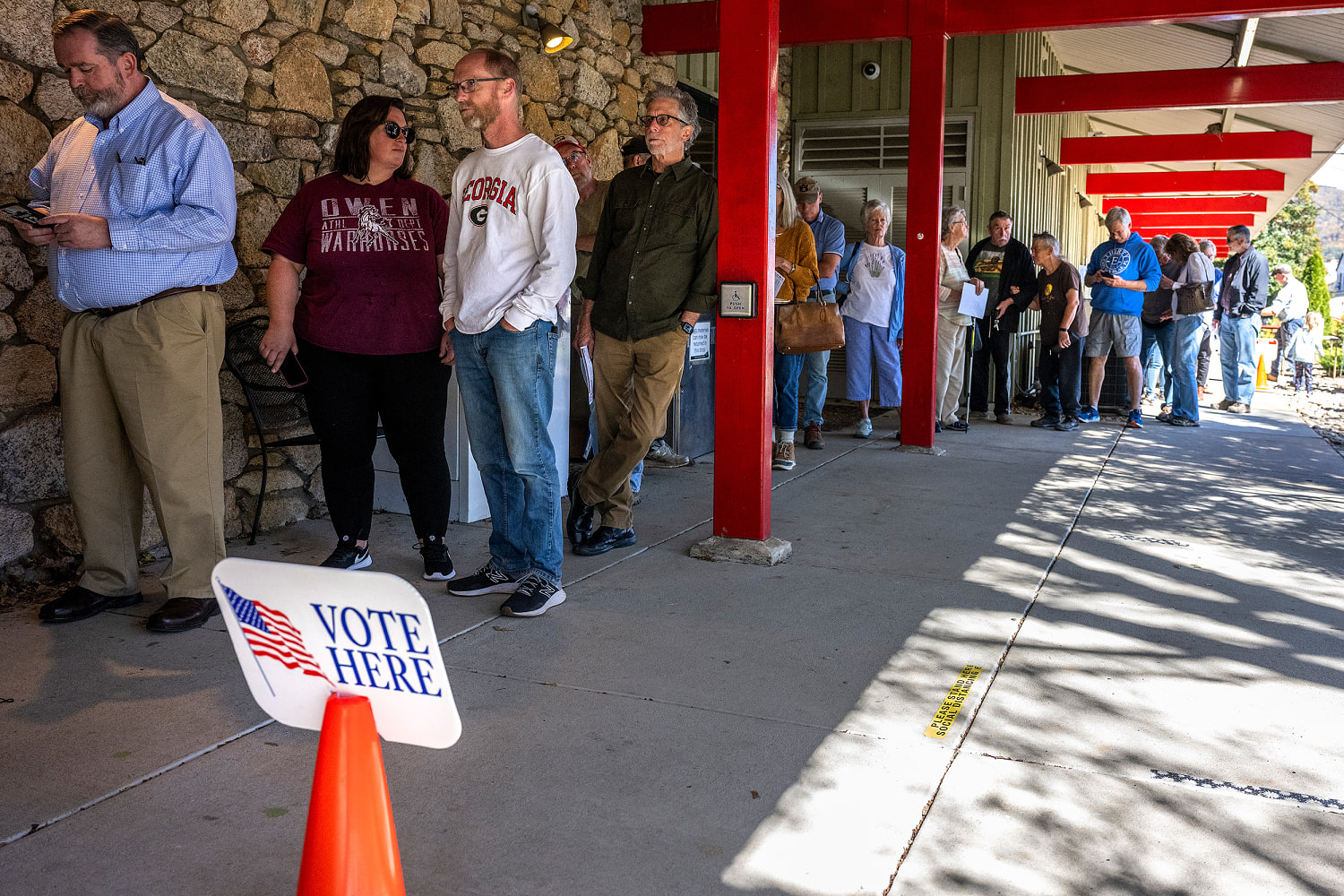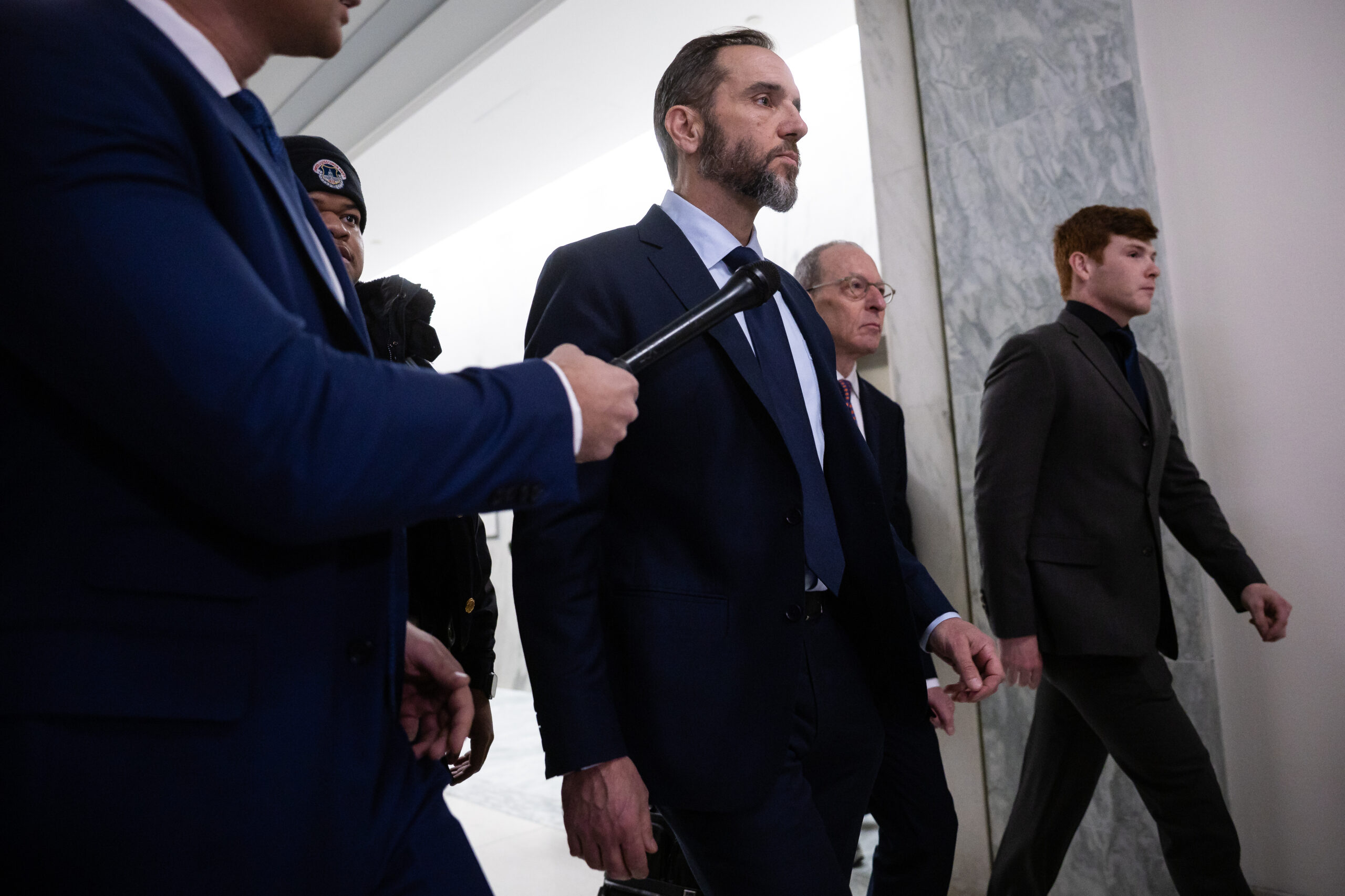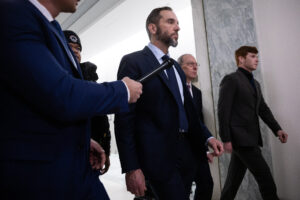Politics
North Carolina voters have seen it all. There’s still cause for optimism.

This article is the third in a five-part series called “Protecting the Election.” As former President Donald Trump and many of his allies refuse to concede his defeat in the 2020 election, this BLN Daily series brings election law and policy experts to explore the many threats to certifying election results at both the state and national levels.
The 2024 election will be a wholly different experience for North Carolina’s more than 5.5 million voters.
North Carolina voters — including college students and voters living in storm-affected areas — are voting early in record numbers.
After years of attacks on voting rights by the gerrymandered GOP supermajority in the state Legislature, North Carolina voters will be required to show a photo ID at the polls for the first time in a presidential election. Coupled with new restrictions on vote-by-mail and lawsuits targeting student voters, Republicans are doing everything they can to suppress the vote among core Democratic voting blocs. These human-made barriers to voting have only been exacerbated in western North Carolina by Hurricane Helene and its aftermath.
Despite these new challenges, North Carolina voters — including college students and voters living in storm-affected areas — are voting early in record numbers, and dedicated election officials across the state are doing everything they can to ensure that voting is safe and convenient.
While most North Carolina voters possess photo ID that meets the state’s new voter ID requirements, there has been some confusion among many voters about this new law. Most importantly for voters, if a voter has been unable to obtain an acceptable photo ID because of lack of transportation, lack of knowledge about the ID requirement or any other reasonable impediment, they may still vote provisionally and complete an ID exception form. While questions linger about how county boards of elections will process exception forms, voters without IDs can still confidently vote even if they lack appropriate photo identification.
A flashpoint in North Carolina’s ongoing voter ID fight is the acceptability of photo IDs from North Carolina’s colleges and universities. After rounds of lawsuits, statutory revisions and rulemaking, students and employees at North Carolina’s colleges and universities are now permitted to use their school IDs for voting, but only if the school’s ID has been pre-approved by the state board of elections. While the board of elections has approved the use of over 130 different school IDs for 2024, these approvals have not been without controversy.
In August, the board of elections approved the use of UNC-Chapel Hill’s digital student ID, the primary form of campus ID for students, which is accessible using a mobile device. The Republican National Committee and state GOP soon filed suit, arguing that, under North Carolina’s voter ID law, only physical ID cards are permitted. While a trial court judge initially ruled that the digital IDs met voter ID requirements, the state court of appeals overruled the trial courts’ decision. The higher courts’ ruling has led to a scramble by UNC-Chapel Hill administrators and student advocacy groups to ensure that students who do not have another acceptable form of voter ID are able to obtain a physical student ID card free of charge.
In the westernmost third of North Carolina, the devastation caused by Hurricane Helene has created significant hurdles to voting.
In addition to implementing voter ID, North Carolina’s Republican Legislature has also further restricted vote-by-mail options. In keeping with the new voter ID requirement, vote-by-mail voters must now submit a photocopy of their ID or a form claiming a voter ID exception along with their ballot. These additional steps make it incrementally more difficult for voters to successfully submit their mail ballot.
Another wrinkle is that previously a voter could mail a ballot by Election Day and have it counted as long as it was received at the county board elections within three days after Election Day. Now, however, mail ballots must be received by the close of voting on Election Day in order to be counted.
In the westernmost third of North Carolina, the devastation caused by Hurricane Helene has created significant hurdles to voting. Helene’s winds and floods destroyed hundreds of homes, displaced thousands and left tens of thousands more still without electricity or running water.
However, in the storm’s wake, the Republican-led Legislature, Democratic majority state board of elections and election administrators across the affected region have come together to provide voters and local election administrators the resources and flexibility to conveniently cast their ballots this fall. Because of this rapid response, 76 of the originally planned 80 early voting sites across the region opened at the start of early voting last week. Additionally, voters in the affected counties have been given the option to return vote-by-mail ballots at any board of elections office or early voting site in the state. Under an existing carveout in North Carolina’s voter ID law, voters who are unable to provide a photo ID because of the natural disaster are excused from presenting photo ID provided they complete the simple exception form.
Despite yearslong Republican voter suppression efforts and the worst natural disaster in state history, there is also cause for optimism. Early voting totals are far outpacing 2020 numbers — and the vast majority of voters across the state are voting without issue.
In the aftermath of Helene, Republicans and Democrats have come together to make sure voters across the state are able to safely and conveniently cast a ballot. Perhaps most importantly, the professional election administrators in North Carolina’s state and county board of elections are uniformly committed to ensuring that every eligible voter is able to cast a ballot and that every ballot is counted in a fair and secure process.
Seth Morris
Seth Morris is an attorney in Raleigh, North Carolina with experience in voting rights and election law.
Politics
Klobuchar delays governor campaign launch as border patrol killing upends Minnesota
Amy Klobuchar planned to officially launch her gubernatorial campaign on Monday, but has delayed it in the wake of the fatal shooting of a protester by immigration agents in Minneapolis over the weekend, according to two people familiar with the Minnesota Democrat’s plans.
The senator instead spent Monday morning speaking to White House officials, urging deescalation and pushing to get the administration to end its immigration crackdown in her state, according to a third person, who is close to the senator and, like the others, was granted anonymity to describe private conversations.
Her decision to wait on her campaign launch comes amid weeks of turmoil in Minnesota that further escalated over the weekend when Border Patrol agents on Saturday fatally shot Alex Pretti, a 37-year-old intensive care unit nurse and American citizen.
Over the last two days, Klobuchar has been meeting with city and state leaders, strategizing with Senate colleagues over Department of Homeland Security funding and calling Trump administration officials, according to the third person, who said Klobuchar’s “focus is on de-escalating the situation and getting ICE out of Minnesota. There’s not time for politics today.”
Klobuchar’s nascent gubernatorial campaign has run headlong into a national crisis, another twist for a campaign that started under unusual circumstances. Earlier this month, Democratic Gov. Tim Walz unexpectedly dropped his reelection bid for a third term, as a swirling fraud scandal threatened to engulf his campaign, and met with Klobuchar about running for the office herself. Since then, two American citizens have been killed by federal immigration agents, thrusting Klobuchar into the center of a battle on an issue for which she’s traditionally cut a moderate profile.
“Regardless of what [campaign] Klobuchar is considering, this is what I’d expect from her, she’s been the leader in this state,” said Democratic Minnesota state Sen. Grant Hauschild. “We’re facing unprecedented circumstances of federal overreach and harm to our communities, and she’s stepped up, being present on the ground and fighting in Congress.”
The two people who described her changed launch plans said they expect the senator to formally launch before next Tuesday, when the state’s party precinct caucus kicks off. Klobuchar already filed paperwork with the state’s campaign finance board last week, allowing her to begin raising funds ahead of an expected bid.
Pretti’s killing also shook up the GOP side of the Minnesota governors’ race. Chris Madel, an attorney who launched his campaign as a Republican late last year, announced on Monday he would be dropping out, calling the Trump administration’s immigration enforcement tactics “wrong” and “an unmitigated disaster.”
“I cannot support the national Republican-stated retribution on the citizens of our state, nor can I count myself a member of a party that would do so,” he said in a video posted to social media.
Klobuchar is not expected to face a serious Democratic opponent when she enters the gubernatorial race, giving her some breathing room on both her announcement timeline and on her stance on immigration. Minnesota Attorney General Keith Ellison, a well-known progressive who was considered a potential candidate, confirmed he would not be running for the job last week.
“What you hear from Klobuchar is, ‘ICE needs to get out of here,’ and I don’t think she needs to say more than that [because] without a primary challenger, I don’t think she’ll have to change her position on it,” said a Minnesota Democratic strategist, granted anonymity to discuss the issue candidly. “She’s smart, she’s careful and she’s cautious, and she knows how to win suburban and independent voters.”
Klobuchar has always cut a moderate profile. She rose up in Hennepin County as its prosecutor before running for Senate. During her presidential campaign in 2020, Klobuchar rejected calls for “abolishing ICE,” drawing fire from immigration rights advocates groups in that race, and instead called for reforms of the agency.
When asked during an interview on NBC’s “Meet the Press” on Sunday whether she supported abolishing ICE, Klobuchar said “we’re always going to have some immigration enforcement in this country, and border control.” But she called for the ICE operation to leave the state because “this agency has been functioning is completely against every tenet of law enforcement.”
Klobuchar ticked through several reforms she supports: “New leadership. Stopping these surges across the country, not just in my state. Training them like they were supposed to be trained. … Mandatory body cameras. Stopping ramming into people’s houses without a judicial warrant.”
Those specifics could become part of Senate Democrats’ demands to give enough votes to pass a bill to fund the Department of Homeland Security and other parts of the government.
Other Democrats have called for more aggressive policies, including abolishing ICE altogether. Rep. Ilhan Omar (D-Minn) posted on X that “voting NO on the DHS funding bill is the bare minimum,” adding that ICE is “beyond reform” and to “abolish it.”
Klobuchar’s approach is once again drawing criticism from some immigrant-rights advocates. “I do not believe that’s far enough,” said George Escobar, executive director of CASA, an immigration advocacy organization. “Unless we deal with the cancer that is causing this, which is ICE itself, and unless we have a comprehensive reform of that agency, which to us, means abolishing it, then honestly, this cycle is just going to repeat over and over again.”One Democratic consultant who has worked on Minnesota races warned that Klobuchar’s deliberative approach could hurt her. “She’s incredibly cautious, and this is not a cautious moment,” they said. “So far, she has not put her foot in it by being too moderate, but she’s also not been under a huge spotlight — and that will change with the gubernatorial run.”
Nonetheless, Klobuchar’s messaging earned her praise from even some progressives. “I think she’s spot on,” said Mark Longabaugh, a former adviser to Sen Bernie Sanders (I-Vt.). “If you’re going to step up and say that this organization needs to be restructured, or shut down and restructured, you also have to tie that to, ‘Listen, there is a legitimate law enforcement need here, both for customs and for border control.’”
Most Minnesota Democrats don’t think Klobuchar will suddenly center anti-ICE messaging in her gubernatorial campaign. Interviews with a half dozen operatives and elected officials found they still expected the campaign to largely revolve around the economy. “Affordability is still going to be central to her work, along with protecting her state,” said the person close to Klobuchar. “She will always stand up for Minnesota on both.”
“Who knows if, in 10 months, it will specifically be a part of the narrative or messaging,” said a Minnesota Democratic donor adviser. “But this isn’t going to go away any time soon … because we’re traumatized here.”
Politics
Jack Smith plans to double down on the need for his Trump investigations

Republicans and Democrats are hoping for a blockbuster hearing from the former special counsel, who is testifying publicly for the first time about his efforts to charge the president…
Read More
Politics
Former Trail Blazer Chris Dudley to run again for governor of Oregon
Former Portland Trail Blazer center Chris Dudley has launched a second attempt to run for governor of Oregon as a Republican, a long-shot bid in a blue state even as the incumbent has struggled in polls.
Dudley, who played six seasons for the Trail Blazers and 16 for the NBA overall, said in an announcement video Monday that he would ease divisiveness and focus on public safety, affordability and education in a state where support for Democratic Gov. Tina Kotek has been low for her entire tenure.
“The empty promises, the name calling, the finger pointing and fear mongering that has solved nothing must stop,” said in his election announcement. “There are real solutions, and I have a plan.”
Dudley is one of the most successful Republicans of the last 25 years in Oregon, coming within 2 points of defeating Democratic Gov. John Kitzhaber in 2010.
“I think it’s imperative that we get somebody from outside of Salem who’s away from the partisan politics, away from the name calling, the finger pointing,” Dudley told The Oregonian. “Who has the expertise and background and the ability to bring people together to solve these issues.”
In his election announcement, Dudley spoke about his love of the state and frustration people have with the current state of politics. He mentioned education, safety and affordability as key issues he plans to address but did not give any key policy specifics.
Dudley is a Yale graduate who worked in finance after leaving the NBA. A diabetic, he also founded a foundation focused on children with Type 1 diabetes.
In the GOP primary, Dudley faces a field that includes state Sen. Christine Drazan, who lost to Kotek by nearly 4 percentage points in 2022.
Other candidates include another state lawmaker, a county commissioner and a conservative influencer who was pardoned by President Donald Trump for his involvement in the Jan. 6, 2021, riot at the U.S. Capitol.
Kotek is a relatively unpopular governor. Her approval rating has consistently remained under 50 percent her entire term in office, according to polling analysis by Morning Consult. She has not announced her campaign but is expected to run for reelection.
Despite expectations that Democrats will do well in the midterms, a number of Oregon Republicans have become more involved in state politics since the last election. Phil Knight, a co-founder of Nike, donated $3 million to an Oregon Republican PAC focused on gaining seats in the state Legislature in October. It was his largest political donation to date, according to the Willamette Week.
Dudley received significant backing from Knight in his 2010 race, but it’s unclear if he will get the same level of support this time around.
Any Republican faces an uphill battle for governor in Oregon, where a GOP candidate has not won since 1982 and where Democrats have a registration edge of about 8 percentage points.
-

 The Dictatorship11 months ago
The Dictatorship11 months agoLuigi Mangione acknowledges public support in first official statement since arrest
-

 Politics11 months ago
Politics11 months agoFormer ‘Squad’ members launching ‘Bowman and Bush’ YouTube show
-

 The Dictatorship5 months ago
The Dictatorship5 months agoMike Johnson sums up the GOP’s arrogant position on military occupation with two words
-

 Politics11 months ago
Politics11 months agoBlue Light News’s Editorial Director Ryan Hutchins speaks at Blue Light News’s 2025 Governors Summit
-

 The Dictatorship11 months ago
The Dictatorship11 months agoPete Hegseth’s tenure at the Pentagon goes from bad to worse
-

 Politics11 months ago
Politics11 months agoFormer Kentucky AG Daniel Cameron launches Senate bid
-
Uncategorized1 year ago
Bob Good to step down as Freedom Caucus chair this week
-

 Politics9 months ago
Politics9 months agoDemocrat challenging Joni Ernst: I want to ‘tear down’ party, ‘build it back up’



